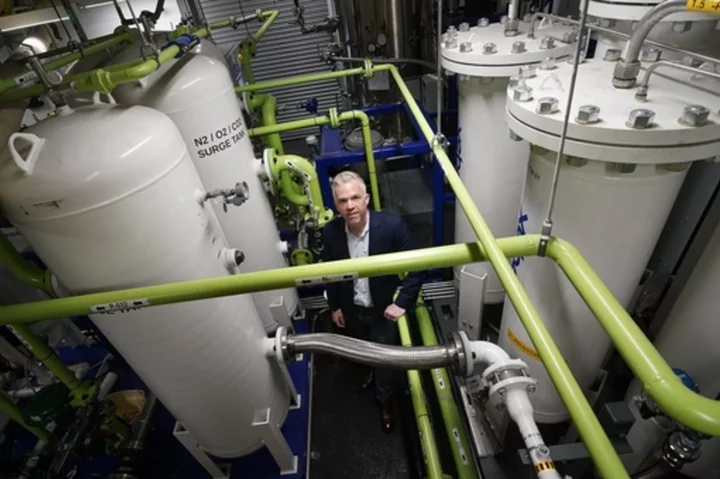
NYC skyscrapers turning to carbon capture to lessen climate change
In a vertical city like New York, any serious effort to address climate change has to focus on the greenhouse gas emissions caused by buildings
2023-05-15 12:24

Funds Marketed as ‘Sustainable’ Hit by Crossborder Reality Check
Hardly any sustainable funds would consistently be able to market themselves as such in the UK, the US
2023-05-15 09:29
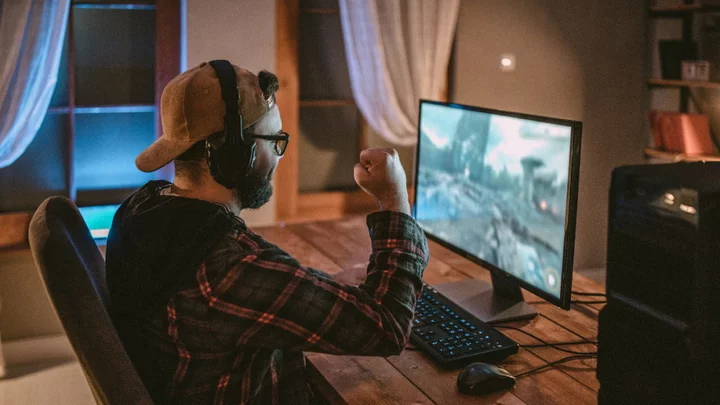
Sweepstakes Rules: Readers' Choice Desktop PCs Survey
Take the Desktop PCs Survey (US Only) OFFICIAL SWEEPSTAKES RULES NO PURCHASE NECESSARY TO ENTER
2023-05-15 08:56

Kate Winslet calls on Government to ‘criminalise harmful content’
Kate Winslet has called on the “people in power” to “criminalise harmful content” as she picked up the leading actress gong at the Bafta TV awards. The Oscar-winning actress, 47, starred alongside her daughter Mia Threapleton in I Am Ruth which chronicles the relationship between a mother and child who is dealing with mental health pressures coming from the online world. On Sunday, Winslet told the ceremony: “I Am Ruth was made for parents and their children, for families who feel that they are held hostage by the perils of the online world, for parents who wish they could still communicate with their teenagers, but who no longer can. “And for young people who have become addicted to social media and its darker sides, this does not need to be your life to people in power, and to people who can make change, please, criminalise harmful content. “Please eradicate harmful content, we don’t want it. “We want our children back. “We don’t want to lie awake, terrified, by our children’s mental health and to any young person who might be listening, who feels that they are trapped in an unhealthy world. “Please ask for help. “There is no shame in admitting that you need support. “It will be there just ask for it.” Her comments came as the House of Lords continued its scrutiny of the Online Safety Bill, which aims to tackle illegal and harmful content online. Winslet stars as Ruth, a concerned mother who witnesses her teenage daughter Freya, played by 22-year-old Threapleton, retreating into herself as she becomes more consumed by the pressures of social media in the two-hour programme. It is an instalment of the female-led drama anthology series I Am, created by filmmaker Dominic Savage, which also picked up a Bafta on the night for the programme with Winslet. Each of the films followed the experience of women in particularly raw, thought-provoking and personal moments. Read More Charity boss speaks out over ‘traumatic’ encounter with royal aide Ukraine war’s heaviest fight rages in east - follow live Humans could be controlled by robots, AI firm’s founder warns AI pioneer warns UK is failing to protect against ‘existential threat’ of machines Most deprived areas being left in broadband slow lane, says LGA
2023-05-15 05:23
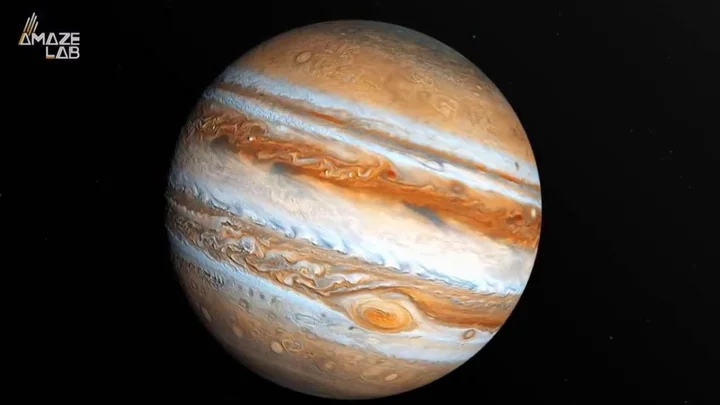
Rare 'ocean' planet found that is twice the size of Earth
A rare planet has been discovered hundreds of light years away, and it could prove key to our understanding of planetary formations out there in the universe. There have been more than 5,300 exoplanets discovered, but few match the description of the newly recorded TOI-733b. Found 245 light-years away, TOI-733b is almost twice the size of Earth and orbits a sun slightly smaller than our Sun. While there are many exoplanets, there are a surprisingly small number which sit between one and a half and two times the radius of the Earth, and it's the size that makes it so interesting to scientists. Sign up to our new free Indy100 weekly newsletter The research was conducted by a team of astronomers led by Iskra Georgieva of Chalmers University of Technology in Sweden. It was accepted for publication in Astronomy & Astrophysics. The team focused on TOI-733b after data on the planet was collected by NASA's telescope TESS. The density of the planet suggests two things – it’s either totally covered in water, or it’s lost its atmosphere altogether. Clues point to the idea of TOI-733b’s atmosphere slowly depleting. That’s due to the proximity of the planet to its star, which it orbits in the space of just 4.9 days. If the atmosphere is being burned away, it means it could soon be transformed into a rock planet. The other possibility points to the planet having lost its hydrogen and helium, while retaining an atmosphere packed with water vapour. "Answering the question of whether TOI-733b has a secondary atmosphere or is an ocean planet boils down to differentiating between a Neptune-like planet that lost its ∼10 per cent of H/He to leave behind a steam atmosphere of heavier volatiles, and one that formed and remained relatively the same throughout its evolution," the research reads. "While being beyond the scope of this paper, finding an answer to this question will have broad implications on our understanding of exoplanets." The team went on to write: "By all accounts TOI-733 b looks to be an interesting planet and holds the potential of being a small but key piece to solving big puzzles in exoplanet science. "With ever increasing in-depth theoretical analyses and the promise of high-precision follow up by present and upcoming facilities, we seem to be well on the way to finding answers to major questions relating to planet formation and evolution." Have your say in our news democracy. Click the upvote icon at the top of the page to help raise this article through the indy100 rankings.
2023-05-15 01:17
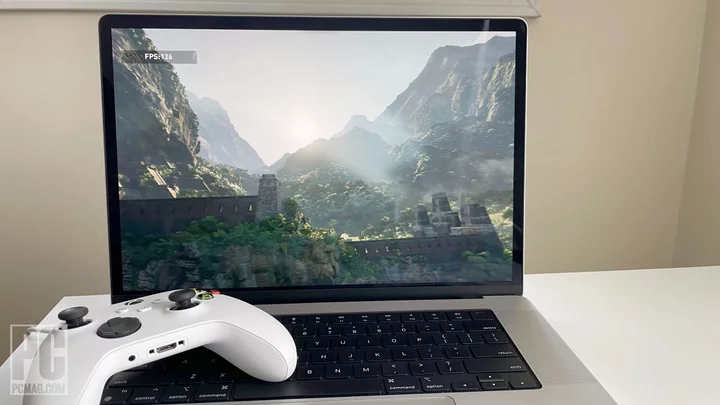
How to Play PC Games on Mac (Without Installing Windows)
It used to be such a common refrain it was nearly a cliché: if you
2023-05-14 21:53

Mushrooms appear to have 'conversations' with each other after it rains
What do you reckon the chattiest vegetable is? The answer may be mushrooms, as according to a new study from scientists in Japan, rain may prompt some fungi to communicate using underground electrical signals. In a study published in Fungal Ecology , researchers monitored small, tan mushrooms known as bicoloured deceivers in the mixed forest at the Kawatabi Field Science Center of Tohoku University in Japandorm. They looked at the 'shrooms electrical potential, measured in megavolts (mV), for about two days in late September and early October 2021. The study site was initially sunny and dry, and the second was during rain - at which point the mushrooms showed some electrical potential and signal transport between each other. Microbial ecologist Yu Fukasawa of Tohoku University said: "Our results confirm the need for further studies on fungal electrical potentials under a true ecological context." Sign up to our free Indy100 weekly newsletter Previously, scientists had found that these mushrooms make subterranean "sheaths" around the exterior of a tree's roots. These sheaths are made of hyphae and when they link underground they form interconnected systems known as mycorrhizal networks that allow forests communicate via chemical signals down tree roots and mycorrhizal fungi. And a 2022 study found patterns of nerve-like electrical activity in some fungi that seem comparable to the structure of human speech. The study identified up to 50 different "words," or groups of spikes in electrical activity, generated by fungal networks. Earlier research has also found that plants can send secret electrical signals underground, possibly even without help from mycorrhizal fungi. Who knew mushrooms had so much to say? Have your say in our news democracy. Click the upvote icon at the top of the page to help raise this article through the indy100 rankings.
2023-05-14 15:46
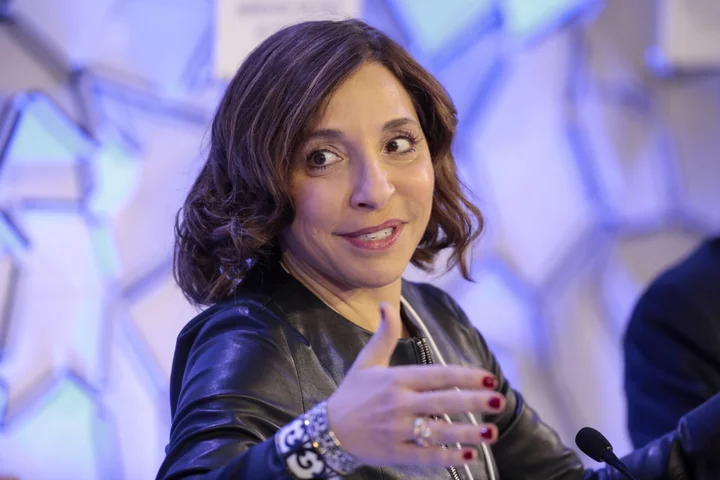
Twitter’s New CEO Says She’s ‘Excited’ to Transform Platform
Twitter’s new Chief Executive Officer Linda Yaccarino said she’s excited to transform the company and achieve owner Elon
2023-05-14 09:22
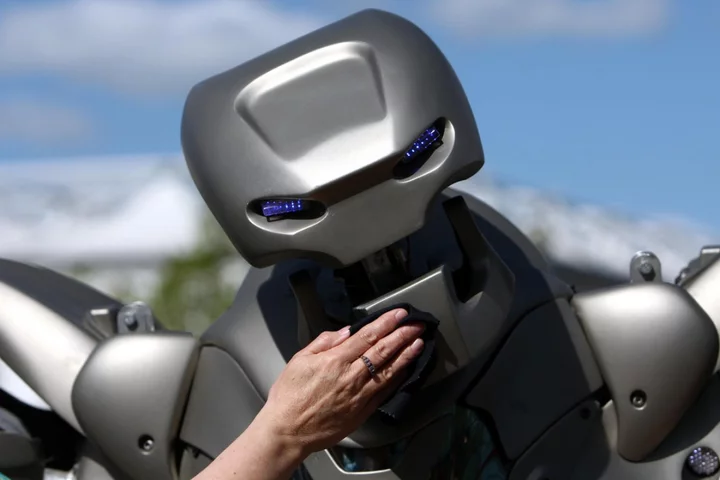
Humans could be controlled by robots, AI firm’s founder warns
Robots could end up controlling humanity, the founder of an artificial intelligence firm will warn. Emad Mostaque, 40, who founded Stability AI three years ago, will say this could happen in a “worst case scenario” and humans could be told “goodbye, you’re kind of boring”. However, governments could soon be shocked into regulating the machines by an event that suddenly makes their impact real, he will add. In an interview with the BBC’s Laura Kuenssberg On Sunday programme, he will say: “If you have a more capable thing than you, what is democracy in that kind of environment? “This is a known unknown because we can’t conceive of something more capable than us but we all know people more capable than us. If you build open models and you do it in the open, you should be criticised if you do things wrong and hopefully lauded if you do some things right Emad Mostaque “My personal belief is that it will be like that movie Her with Scarlett Johansson and Joaquin Phoenix, humans are a bit boring and it will be like ‘goodbye, you’re kind of boring’, but I could be wrong. “It deserves to be discussed in a public sphere, if we have agents more capable than us that we cannot control, that are going across the internet and hooked up and they achieve a level of automation, what does that mean? “The worst case scenario is that it proliferates and basically it controls humanity because you could have a million things replicating effectively, but we don’t know.” He believes the moment that actor Tom Hanks caught coronavirus in March 2020 was the moment millions understood the risk of the novel disease. When a similar moment arrives with artificial intelligence governments will conclude “we need policy now”, he will claim. The impact of the new machines could be “painful” to begin with and their effect on the economy could be greater than that caused by the pandemic, he believes. However, he thinks the jobs which disappear will be replaced by better ones because machines will do menial tasks, allowing us to concentrate on the things which make us human. The new technology could also bring “huge” benefits, he claims. Companies such as ChatGPT and DeepMind will be bigger than Google and Facebook in 10 years time, he adds. Stability AI has already been valued at 1 billion dollars (£803 million) and could soon be worth 4 billion dollars (£3.2 billion) as more money, including from Hollywood star Ashton Kutcher, floods into it. The company created Stable Diffusion, a tool which uses AI to make images from simple text instructions by analysing pictures found online. Mr Mostaque, a mathematician, is determined to keep his technology open source – allowing anyone to look at the code, share it and use it. He believes this should give the public the confidence that the technology will not become too dangerous. He will say: “I think there shouldn’t have to be a need for trust. “If you build open models and you do it in the open, you should be criticised if you do things wrong and hopefully lauded if you do some things right.” However, Getty Images is currently engaged in legal action against his company, with the photo agency claiming the rights to the images it sells have been infringed. Read More Charity boss speaks out over ‘traumatic’ encounter with royal aide Ukraine war’s heaviest fight rages in east - follow live AI pioneer warns UK is failing to protect against ‘existential threat’ of machines TikTok ‘does not want to compete with BBC for Eurovision final viewers’ Eurovision’s preparations for potential Russia cyberthreat ‘in good place’
2023-05-14 02:47

Google to Pay Texas $8 Million to Settle Deceptive Pixel 4 Ad Claim
Google has agreed to shell out $8 million to Texas over deceptive ads it made
2023-05-14 02:45

Biden previews 2024 election pitch to young Black voters in Howard University commencement speech
President Joe Biden previewed his 2024 election pitch to young Black voters Saturday in commencement remarks at a Howard University graduation ceremony in Washington, DC, articulating his vision of a "future for all Americans,"
2023-05-14 02:21

AI pioneer warns UK is failing to protect against ‘existential threat’ of machines
One of the pioneers of artificial intelligence has warned the government is not safeguarding against the dangers posed by future super-intelligent machines. Professor Stuart Russell told The Times ministers were favouring a light touch on the burgeoning AI industry, despite warnings from civil servants it could create an existential threat. A former adviser to both Downing Street and the White House, Prof Russell is a co-author of the most widely used AI textbook and lectures on computer science at the University of California, Berkeley. He told The Times a system similar to ChatGPT – which has passed exams and can compose prose – could form part of a super-intelligence machine which could not be controlled. “How do you maintain power over entities more powerful than you – forever?” he asked. “If you don’t have an answer, then stop doing the research. It’s as simple as that. “The stakes couldn’t be higher: if we don’t control our own civilisation, we have no say in whether we continue to exist.” In March, he co-signed an open letter with Elon Musk and Apple co-founder Steve Wozniak warning of the “out-of-control race” going on at AI labs. The letter warned the labs were developing “ever more powerful digital minds that no one, not even their creators, can understand, predict or reliably control”. Prof Russell has worked for the UN on a system to monitor the nuclear test-ban treaty and was asked to work with the Government earlier this year. “The Foreign Office … talked to a lot of people and they concluded that loss of control was a plausible and extremely high-significance outcome,” he said. “And then the government came out with a regulatory approach that says: ‘Nothing to see here… we’ll welcome the AI industry as if we were talking about making cars or something like that’.” He said making changes to the technical foundations of AI to add necessary safeguards would take “time that we may not have”. “I think we got something wrong right at the beginning, where we were so enthralled by the notion of understanding and creating intelligence, we didn’t think about what that intelligence was going to be for,” he said. We've sort of got the message and we're scrambling around trying to figure out what to do Professor Stuart Russell “Unless its only purpose is to be a benefit to humans, you are actually creating a competitor – and that would be obviously a stupid thing to do. “We don’t want systems that imitate human behaviour… you’re basically training it to have human-like goals and to pursue those goals. “You can only imagine how disastrous it would be to have really capable systems that were pursuing those kinds of goals.” He said there were signs of politicians becoming aware of the risks. “We’ve sort of got the message and we’re scrambling around trying to figure out what to do,” he said. “That’s what it feels like right now.” The government has launched the AI Foundation Model Taskforce which it says will “lay the foundations for the safe use of foundation models across the economy and ensure the UK is at the forefront of this pivotal AI technology”. Read More ChatGPT creators try to use artificial intelligence to explain itself – and come across major problems Artificial intelligence could ‘transform’ heart attack diagnosis, scientists say Hackers aim to find flaws in AI - with White House help ChatGPT user in China detained for creating and spreading fake news, police say Charity boss speaks out over ‘traumatic’ encounter with royal aide Ukraine war’s heaviest fight rages in east - follow live
2023-05-13 21:51
